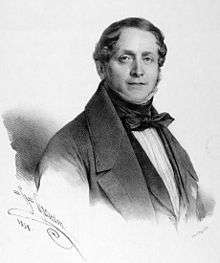Marco Bordogni

Giulio Marco Bordogni (23 January 1789 – 31 July 1856), usually called Marco Bordogni, was an Italian operatic tenor and singing teacher of great popularity and success, whose mature career was based in Paris.[1]
Biography

Bordogni was born in Gazzaniga, near Bergamo, Italy. He was a product of the Bergamo tenor school which originated with Giacomo David and Gaetano Crivelli, and in which can be counted, in addition to David's two best pupils (namely his son Giovanni and Andrea Nozzari, both notable in Rossini's operas), and besides Bordogni himself, also Domenico Donzelli and Giovanni Battista Rubini .[2]
Bordogni made his operatic debut in Novara in 1808 without initially meeting with much success. In 1813 he distinguished himself as a performer of the role of Argirio in Rossini's Tancredi[3] at the Ferrara revival with a tragic ending[4] and at the inauguration of the Teatro Re in Milan, and became later very active in promoting that composer's music. He appeared in many of Rossini's operas on their first presentation in various towns and theatres, mainly performing the roles originally sung by Giovanni David.[3] In 1825 he created the role of Conte di Libenskof in Rossini's Il viaggio a Reims.[5] He sang for many years at the Théâtre des Italiens in Paris. He became a in teacher at the Paris Conservatoire in 1823 and continued to teach there until shortly before his death, which occurred in Paris.[3]
He was the author of a published singing method, and composed many sets of vocalises which remained in use for singers for a century afterwards. Indeed, they still remain in use in transcriptions for other instruments. He was probably the most influential teacher of the English tenor Sims Reeves, who went to him in 1843:[6] other students include Sophie Cruvelli and Giovanni Matteo Mario.
Bordogni was awarded the Légion d'Honneur on 10 May 1839 by M. de Gasparin, at the same time that it was awarded to the Director of the Opéra Duponchel, and to the composer Hector Berlioz, who wrote that Bordogni was the best singing-master of that period.[7] His daughter Louise Bordogni sang successfully in New York City in 1834.
Town or theatre first performances of Rossini operas
The following list comprises town or theatre first performances of Rossini operas in which Marco Bordogni appeared. From this list one can recognize the singer's considerable virtuosity, ranging between his traditional baritonal tenor roles, and the leading tenore contraltino parts written by Rossini in tragic, serio-comic and comic operas.
In addition to the Rossini roles, Bordogni also gave first performances at the Théâtre-Italien in Paër’s Agnese di Fitz-Henry (Ernesto) in 1819; in Mayr’s Medea in Corinto (Giasone) in 1823; in Mercadante’s Elisa e Claudio ossia L'amore protetto dall'amicizia (Claudio) (also in 1823); and in Vaccai’s Giulietta e Romeo (Capellio) in 1827.
| Rôle | Opera’s title | Theatre | Town | First performance’s date |
|---|---|---|---|---|
| Argirio | Tancredi | Teatro Re (inauguration) | Milan | 18 December 1813 |
| Argirio | Tancredi | Real Teatro San Carlo | Naples | 14 April 1818 |
| duca Bertrando | L'inganno fortunato (L’inganno felice) | Salle Louvois du Théâtre-Italien | Paris | 13 May 1819 |
| Narciso | Il turco in Italia | Salle Louvois du Théâtre-Italien | Paris | 23 May 1820 |
| Jago | Otello ossia Il moro di Venezia | Salle Louvois du Théâtre-Italien | Paris | 5 June 1821 |
| Giannetto | La gazza ladra | Salle Louvois du Théâtre-Italien | Paris | 18 September 1821 |
| Leicester | Elisabetta, regina d'Inghilterra | Salle Louvois du Théâtre-Italien | Paris | 10 March 1822 |
| Argirio | Tancredi | Salle Louvois du Théâtre-Italien | Paris | 23 April 1822 |
| Ramiro | La Cenerentola ossia La bontà in trionfo | Salle Louvois du Théâtre-Italien | Paris | 8 June 1822 |
| Osiride | Mosè in Egitto | Salle Louvois du Théâtre-Italien | Paris | 20 October 1822 |
| Giacomo V-Uberto | La donna del lago | Théâtre de l'Académie Royale de Musique | Paris | 7 September 1824 |
| Liebenskof | Il viaggio a Reims (premiere) | Salle Louvois du Théâtre-Italien | Paris | 19 June 1825 |
| Idreno | Semiramide | Salle Louvois du Théâtre-Italien | Paris | 8 December 1825 |
| Antenore | Zelmira | Salle Louvois du Théâtre-Italien | Paris | 14 March 1826 |
| Almaviva | Le barbier de Séville ou La précaution inutile (in French) | Théâtre de l'Académie Royale de Musique | Paris | 14 January 1828 |
Notes and references
- ↑ Principal source: Joannes Rochut, Melodious Etudes for Trombone: Selection from the Vocalises of Marco Bordogni, Transcribed and Progressively Arranged by Joannes Rochut, in 3 Books (Carl Fischer, New York 1928).
- ↑ Salvatore Caruselli (ed), Grande enciclopedia della musica lirica, Longanesi , Roma, p 334 (article: Giacomo David).
- 1 2 3 Celletti, Rodolfo, Voce di tenore, IdeaLibri, 1989, p. 82, ISBN 88-7082-127-7
- ↑ Casaglia.
- ↑ Marco Beghelli e Nicola Gallino (a cura di), Tutti i libretti di Rossini, Milan, Garzanti, 1991, pp. 741-742, ISBN 88-11-41059-2.
- ↑ S. Reeves, The Life of Sims Reeves, Written by Himself (Simpkin, Marshall co, London 1888), p. 32.
- ↑ H. Berlioz, Memoirs of Hector Berlioz from 1803 to 1865 (Alfred Knopf, New York 1932), 213.
- Casaglia, Gherardo (2005).[http://www.amadeusonline.net/almanacco?r=&alm_testo=Marco_Bordogni "Marco Bordogni"]. Almanacco Amadeus (Italian).